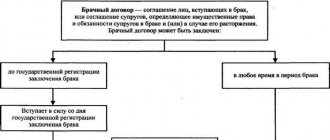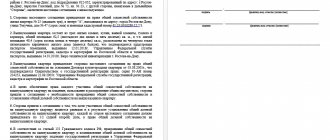New edition of Art. 42 Residential Complex of the Russian Federation
1. The share in the right of common ownership of common property in a communal apartment of the owner of a room in this apartment is proportional to the size of the total area of the specified room.
2. The share in the right of common ownership of common property in an apartment building of the owner of a room in a communal apartment located in this house is proportional to the sum of the dimensions of the total area of the specified room and determined in accordance with the share in the right of common ownership of common property in the communal apartment of this owner of the area premises constituting the common property in this apartment.
3. The share in the right of common ownership of common property in a communal apartment of the owner of a room in this apartment follows the fate of the right of ownership of the specified room.
4. When transferring ownership of a room in a communal apartment, the share in the right of common ownership of the common property in this apartment of the new owner of such a room is equal to the share in the right of common ownership of the specified common property of the previous owner of such a room.
5. The owner of a room in a communal apartment has no right:
1) to allocate in kind his share in the right of common ownership of common property in a given apartment;
2) alienate his share in the right of common ownership of the common property in this apartment, as well as perform other actions entailing the transfer of this share separately from the right of ownership of the specified room.
6. When selling a room in a communal apartment, the remaining owners of rooms in this communal apartment have a pre-emptive right to purchase the alienated room in the manner and under the conditions established by the Civil Code of the Russian Federation.
HOUSING CODE OF THE RF 2021
Section III. Residential premises provided under social rental agreements
Chapter 7. Grounds and procedure for providing residential premises under a social tenancy agreement
Article 49. Provision of residential premises under a social tenancy agreement
1. Under a social tenancy agreement, residential premises of the state or municipal housing stock are provided. 2. Low-income citizens recognized on the grounds established by this Code as needing residential premises provided under social tenancy agreements are provided with residential premises of the municipal housing stock under social tenancy agreements in the manner prescribed by this Code. For the purposes of this Code, low-income citizens are citizens if they are recognized as such by a local government body in the manner established by the law of the relevant constituent entity of the Russian Federation, taking into account the income per family member and the value of property owned by family members and subject to taxation. 3. Residential premises of the housing stock of the Russian Federation or the housing stock of a constituent entity of the Russian Federation under social tenancy agreements are provided by another specified federal law, a decree of the President of the Russian Federation or a law of a constituent entity of the Russian Federation to categories of citizens recognized according to established by this Code and (or) federal law, decree of the President of the Russian Federation or the law of a constituent entity of the Russian Federation on the basis of those in need of residential premises. These residential premises are provided in the manner established by this Code, unless a different procedure is provided for by the specified federal law, a decree of the President of the Russian Federation or the law of a constituent entity of the Russian Federation. (Part three as amended by Federal Law No. 250-FZ of December 29, 2006) 4. The categories of citizens specified in Part 3 of this article may be provided under social tenancy agreements with residential premises of the municipal housing stock by local government bodies if these bodies are vested in the prescribed manner legislation and state powers to provide these categories of citizens with residential premises. Residential premises of the municipal housing stock under social tenancy agreements are provided to the specified categories of citizens in the manner established by this Code, unless a different procedure is provided for by federal law, a decree of the President of the Russian Federation or the law of a constituent entity of the Russian Federation. (as amended by Federal Law No. 250-FZ of December 29, 2006) 5. Residential premises under social tenancy agreements are not provided to foreign citizens or stateless persons, unless otherwise provided by an international treaty of the Russian Federation.
Article 50. Norm for provision and accounting norm for the area of residential premises
1. The norm for the provision of residential space under a social tenancy agreement (hereinafter referred to as the provision norm) is the minimum size of the residential premises, on the basis of which the size of the total area of residential premises provided under a social tenancy agreement is determined. 2. The provision rate is established by the local government depending on the level of provision of residential premises provided under social tenancy agreements achieved in the relevant municipality and other factors. 3. Federal laws, decrees of the President of the Russian Federation, laws of the constituent entities of the Russian Federation establishing the procedure for the provision of residential premises under social tenancy agreements to the categories of citizens specified in Part 3 of Article 49 of this Code, other standards of provision may be established for these categories of citizens. (as amended by Federal Law No. 250-FZ of December 29, 2006) 4. The accounting norm for the area of residential premises (hereinafter referred to as the accounting norm) is the minimum size of the area of living premises, on the basis of which the level of provision of citizens with the total area of living premises is determined for the purpose of their adoption registered as those in need of residential premises. 5. The accounting norm is established by the local government body. The size of such a norm cannot exceed the size of the provision norm established by this body. 6. Federal laws, decrees of the President of the Russian Federation, laws of the constituent entities of the Russian Federation establishing the procedure for providing residential premises under social tenancy agreements to the categories of citizens specified in Part 3 of Article 49 of this Code, other accounting standards may be established for these categories of citizens. (part six introduced by Federal Law dated December 29, 2006 N 250-FZ)
Article 51. Grounds for recognizing citizens as needing residential premises provided under social tenancy agreements
1. Citizens in need of residential premises provided under social tenancy agreements are recognized (hereinafter referred to as those in need of residential premises):
1) who are not tenants of residential premises under social tenancy agreements, rental agreements for residential premises of a social housing stock or members of the family of a tenant of a residential premises under a social tenancy agreement, an agreement for the rental of residential premises of a social housing stock, or owners of residential premises or family members of the owner of a residential premises; (as amended by Federal Law No. 217-FZ of July 21, 2014) 2) who are tenants of residential premises under social tenancy agreements, lease agreements for residential premises of a housing fund for social use, or family members of the tenant of residential premises under a social tenancy agreement, tenancy agreement for residential premises social use fund or by the owners of residential premises or family members of the owner of the residential premises and provided with a total area of residential premises per family member less than the accounting norm; (as amended by Federal Law No. 217-FZ of July 21, 2014) 3) living in premises that do not meet the requirements established for residential premises; 4) who are tenants of residential premises under social tenancy agreements, lease agreements for residential premises of a social housing stock, family members of a tenant of a residential premises under a social tenancy agreement, a tenancy agreement for residential premises of a social housing stock or owners of residential premises, family members of the owner of a residential premises living in an apartment occupied by several families, if the family includes a patient suffering from a severe form of chronic disease, in which living together with him in the same apartment is impossible, and who do not have other residential premises occupied under a social tenancy agreement, a rental agreement for residential premises of the housing stock social use or owned by right of ownership. The list of relevant diseases is established by the federal executive body authorized by the Government of the Russian Federation. (as amended by Federal Laws dated July 23, 2008 N 160-FZ, dated July 21, 2014 N 217-FZ)
2. If a citizen and (or) members of his family have several residential premises occupied under social tenancy agreements, rental agreements for residential premises of the housing stock for social use and (or) owned by them, the level of provision with the total area of the residential premises is determined based on from the total total area of all specified residential premises. (as amended by Federal Law dated July 21, 2014 N 217-FZ)
Note: Citizens registered before 03/01/2005 to receive housing on social rent retain the right to receive housing in the manner prescribed by the Housing Code of the Russian Federation (Federal Law of December 29, 2004 N 189-FZ).
Article 52. Registration of citizens as those in need of residential premises
1. Residential premises under social tenancy agreements are provided to citizens who are registered as needing residential premises, except for the cases established by this Code. 2. The categories of citizens specified in Article 49 of this Code who may be recognized as needing residential premises have the right to be registered as those in need of residential premises. If a citizen has the right to be registered on several grounds (as a low-income citizen and as belonging to a category defined by federal law, a decree of the President of the Russian Federation or the law of a constituent entity of the Russian Federation), at his choice such a citizen can be registered on one of these grounds or for all reasons. (as amended by Federal Law No. 250-FZ of December 29, 2006) 3. Registration of citizens as those in need of residential premises is carried out by the local government body (hereinafter referred to as the body carrying out registration) on the basis of applications from these citizens (hereinafter referred to as applications on registration) submitted by them to the specified authority at their place of residence or through a multifunctional center in accordance with the interaction agreement concluded by them in the manner established by the Government of the Russian Federation. In cases and in the manner established by law, citizens can submit applications for registration at a location other than their place of residence. The registration of incapacitated citizens is carried out on the basis of applications for registration submitted by their legal representatives. (as amended by Federal Law No. 133-FZ of July 28, 2012) 4. Applications for registration must be accompanied by documents confirming the right of the relevant citizens to be registered as those in need of residential premises, except for documents received by interdepartmental requests by the authority carrying out registration. The citizen who has submitted an application for registration is issued a receipt from the applicant for these documents, indicating their list and the date of their receipt by the body carrying out the registration, as well as indicating the list of documents that will be received upon interdepartmental requests. The body carrying out registration independently requests documents (their copies or the information contained in them) necessary for the registration of a citizen from state authorities, local government bodies and organizations subordinate to state bodies or local government bodies, which have the data at their disposal. documents (their copies or information contained in them) in accordance with regulatory legal acts of the Russian Federation, regulatory legal acts of constituent entities of the Russian Federation, municipal legal acts, if such documents were not submitted by the applicant on his own initiative. In case of submission of documents through a multifunctional center, a receipt is issued by the specified multifunctional center. (Part 4 as amended by Federal Law dated December 3, 2011 N 383-FZ (as amended on July 28, 2012)) 5. The decision to register or refuse to register must be made based on the results of consideration of the application for registration and other documents submitted or received upon interdepartmental requests in accordance with Part 4 of this article by the body carrying out registration, no later than thirty working days from the date of submission of documents, the obligation to submit which is assigned to the applicant, to this body. If a citizen submits an application for registration through a multifunctional center, the period for making a decision on registration or refusal to register is calculated from the day the multifunctional center transmits such an application to the body carrying out registration. (Part 5 as amended by Federal Law dated December 3, 2011 N 383-FZ (as amended on July 28, 2012)) 6. The body carrying out registration, including through a multifunctional center, no later than three working days from the date of acceptance the decision on registration issues or sends to the citizen who submitted the corresponding application for registration a document confirming the adoption of such a decision. If a citizen submits an application for registration through a multifunctional center, a document confirming the decision is sent to the multifunctional center, unless another method of receipt is specified by the applicant. (as amended by Federal Law No. 133-FZ of July 28, 2012) 7. The procedure for a local government body to register citizens as those in need of residential premises is established by the law of the relevant constituent entity of the Russian Federation.
Article 53. Consequences of citizens deliberately worsening their living conditions
Citizens who, with the intention of acquiring the right to be registered as those in need of residential premises, have committed actions as a result of which such citizens can be recognized as needing residential premises, are registered as those in need of residential premises no earlier than five years from the date of the commission specified intentional actions.
Article 54. Refusal to register citizens as those in need of residential premises
1. Refusal to register citizens as those in need of residential premises is permitted if:
1) the documents provided for in Part 4 of Article 52 of this Code, the obligation to submit which is assigned to the applicant, have not been submitted; (as amended by Federal Law dated December 3, 2011 N 383-FZ) 1.1) the response of a state authority, local government body or organization subordinate to a state authority or local government body to an interdepartmental request indicates the absence of the document and (or) information necessary for registration of citizens as those in need of residential premises in accordance with Part 4 of Article 52 of this Code, if the relevant document was not submitted by the applicant on his own initiative, except in cases where the absence of such requested document or information at the disposal of such bodies or organizations confirms the right the relevant citizens are registered as those in need of residential premises; (Clause 1.1 introduced by Federal Law dated December 3, 2011 N 383-FZ) 2) documents are presented that do not confirm the right of the relevant citizens to be registered as those in need of residential premises; 3) the period provided for in Article 53 of this Code has not expired.
2. The decision to refuse registration must contain the grounds for such refusal with a mandatory reference to the violations provided for in Part 1 of this article. 3. The decision to refuse registration is issued or sent to the citizen who submitted the corresponding application for registration no later than three working days from the date of such decision and can be appealed by him in court.
Article 55. Reservation of the right of citizens to be registered as those in need of residential premises
The right to be registered as those in need of residential premises is retained by citizens until they receive residential premises under social tenancy agreements or until the grounds for deregistration provided for in Article 56 of this Code are identified.
Note: Citizens registered before 03/01/2005 are deregistered on the grounds of clauses 1, 3 - 6, part 1, art. 56 of the Housing Code of the Russian Federation or the loss of the grounds that, before the entry into force of the Housing Code of the Russian Federation, gave the right to housing on social rent (Federal Law of December 29, 2004 N 189-FZ).
Article 56. Removal of citizens from registration as those in need of residential premises
1. Citizens are deregistered as those in need of residential premises in the following cases:
1) they submit an application for deregistration at the place of registration; 2) their loss of the grounds giving them the right to receive residential premises under a social tenancy agreement; 3) their departure to their place of residence in another municipal entity, with the exception of cases of change of place of residence within the federal cities of Moscow, St. Petersburg and Sevastopol; (as amended by Federal Law No. 217-FZ dated July 21, 2014) 4) they receive, in the prescribed manner, budget funds from a government body or local government body for the purchase or construction of residential premises;
Note: From January 1, 2021, Federal Law dated July 29, 2017 N 217-FZ amends paragraph 5 of part 1 of Article 56.
5) provision to them in the prescribed manner from a state authority or local government body of a land plot for the construction of a residential building, with the exception of citizens with three or more children; (as amended by Federal Law No. 55-FZ dated 05.06.2012) 6) identification in the documents submitted to the body carrying out registration of information that does not correspond to reality and served as the basis for registration, as well as unlawful actions of officials of the body carrying out registration registration, when deciding on registration. (as amended by Federal Law dated December 3, 2011 N 383-FZ)
2. Decisions to deregister citizens as those in need of residential premises must be made by the body on the basis of whose decisions such citizens were admitted to this registration, no later than thirty working days from the date of identification of the circumstances that serve as the basis for such decisions. Decisions on deregistration of citizens as those in need of residential premises must contain the grounds for deregistration with mandatory reference to the circumstances provided for in Part 1 of this article. Decisions to deregister citizens as those in need of residential premises are issued or sent to citizens in respect of whom such decisions were made no later than three working days from the date of such decisions and can be appealed by these citizens in court. 3. Citizens registered as needing residential premises by the local government of the municipality at the place of residence of such citizens and who changed their place of residence in connection with the provision to such citizens of residential premises under rental agreements of the housing stock for the social use of residential premises located within the boundaries of another municipal education (in the constituent entities of the Russian Federation - the federal cities of Moscow, St. Petersburg and Sevastopol - in the municipality of another constituent entity of the Russian Federation), are not subject to deregistration as those in need of residential premises at their previous place of residence. (Part 3 introduced by Federal Law dated July 21, 2014 N 217-FZ)
Article 57. Provision of residential premises under social tenancy agreements to citizens registered as needing residential premises
1. Residential premises are provided to citizens registered as needing residential premises in order of priority based on the time such citizens were registered, with the exception of the cases established by part 2 of this article. 2. Out of turn, residential premises under social tenancy agreements are provided to:
1) citizens whose residential premises are recognized in accordance with the established procedure as unfit for habitation and are not subject to repair or reconstruction; 2) became invalid on January 1, 2013. — Federal Law dated February 29, 2012 N 15-FZ; 3) citizens suffering from severe forms of chronic diseases specified in the list provided for in paragraph 4 of part 1 of Article 51 of this Code.
3. Citizens registered as needing residential premises are provided with residential premises under social tenancy agreements on the basis of decisions of the local government body. Decisions on the provision of residential premises under social tenancy agreements are issued or sent to citizens in respect of whom these decisions were made no later than three working days from the date of adoption of these decisions. 4. The decision to provide residential premises under a social tenancy agreement, made in compliance with the requirements of this Code, is the basis for concluding the corresponding social tenancy agreement within the period established by this decision. 5. Under a social tenancy agreement, residential premises must be provided to citizens at their place of residence (within the boundaries of the relevant locality) with a total area per person not less than the provision norm. (as amended by Federal Law No. 316-FZ of December 17, 2009) 6. Rooms under social rental agreements may be provided only in the case provided for in Part 4 of Article 59 of this Code. 7. When determining the total area of residential premises provided under a social tenancy agreement to a citizen who owns residential premises, the area of the residential premises owned by him is taken into account. 8. When providing a citizen with residential premises under a social tenancy agreement, actions and civil transactions with residential premises are taken into account, the commission of which led to a reduction in the size of the occupied residential premises or to their alienation. The specified transactions and actions are taken into account for the period established by the law of the constituent entity of the Russian Federation preceding the provision of residential premises to a citizen under a social tenancy agreement, but not less than five years. 9. The procedure for determining the total area of the provided residential premises in the cases specified in Part 8 of this article is established by the legislation of the constituent entities of the Russian Federation.
Article 58. Taking into account the legitimate interests of citizens when providing residential premises under social tenancy agreements
1. When providing residential premises under social tenancy agreements, occupancy of one room by persons of different sexes, with the exception of spouses, is permitted only with their consent. 2. Residential premises under a social tenancy agreement may be provided with a total area exceeding the norm for provision per person, but not more than twice, if such residential premises are one room or a one-room apartment or are intended for the occupancy of a citizen suffering from one of the severe forms of chronic diseases specified in the list provided for in paragraph 4 of part 1 of Article 51 of this Code.
Article 59. Provision of vacated residential premises in a communal apartment
1. Vacant residential premises in a communal apartment in which several tenants and (or) owners live, on the basis of their application, are provided under a social tenancy agreement to the tenants and (or) owners living in this apartment, if at the time of vacating the residential premises they are recognized or can be, in accordance with the established procedure, recognized as low-income and in need of housing. 2. In the absence of citizens specified in part 1 of this article in a communal apartment, the vacated residential premises are provided under a social tenancy agreement to the tenants and (or) owners living in this apartment, who may be recognized as low-income in the prescribed manner and who are provided with the total area of the residential premises per family member less than the provision norm, based on their application. 3. In the absence of citizens specified in parts 1 and 2 of this article in the communal apartment, the vacated residential premises are provided under a purchase and sale agreement to citizens who are provided with a total living area per family member that is less than the provision norm, based on their application. 4. If there are no citizens specified in parts 1 - 3 of this article in the communal apartment, moving into the vacated residential premises is carried out on the basis of a social tenancy agreement in the manner prescribed by this Code.
Article 30 of the Housing Code of the Russian Federation. Rights and obligations of the owner of a residential premises
- The owner of a residential premises exercises the rights of ownership, use and disposal of the residential premises belonging to him by right of ownership in accordance with its purpose and the limits of its use, which are established by this Code.
- The owner of a residential premises has the right to provide possession and (or) use of residential premises belonging to him by right of ownership to a citizen on the basis of a lease agreement, a contract of gratuitous use or on other legal grounds, as well as to a legal entity on the basis of a lease agreement or on other legal grounds, taking into account requirements established by civil legislation and this Code.
- The owner of a residential premises bears the burden of maintaining this premises and, if this premises is an apartment, the common property of the owners of the premises in the corresponding apartment building, and the owner of a room in a communal apartment also bears the burden of maintaining the common property of the owners of the rooms in such an apartment, unless otherwise provided by federal law or agreement.
- The owner of a residential premises is obliged to maintain the premises in proper condition, preventing mismanagement of them, to comply with the rights and legitimate interests of neighbors, the rules for the use of residential premises, as well as the rules for maintaining the common property of the owners of premises in an apartment building.
Article 33 of the RF Housing Code. Use of residential premises provided by testamentary refusal
- A citizen who, by testamentary refusal, has been granted the right to use residential premises for the period specified in the relevant will, uses this residential premises on an equal basis with the owner of this residential premises. Upon expiration of the period for using the residential premises established by the testamentary refusal, the right to use the residential premises of the relevant citizen is terminated, except for cases where the right to use this residential premises of the relevant citizen arose on another legal basis.
- Citizens with legal capacity and limited legal capacity by the court who live in residential premises provided by testamentary refusal bear joint and several liability with the owner of such residential premises for the obligations arising from the use of such residential premises, unless otherwise provided by an agreement between the said owner and citizens.
- A citizen living in residential premises provided by testamentary refusal has the right to demand state registration of the right to use the residential premises arising from the testamentary refusal.







